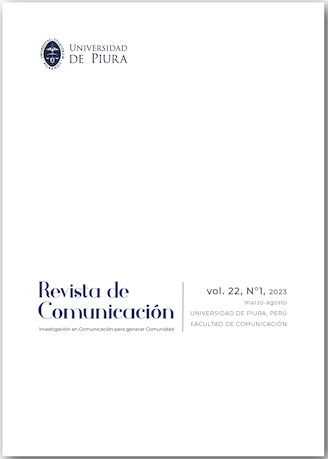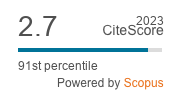The journalistic shaping of heroes and anti-heroes on Twitter: Zelensky and Putin in the Ukraine war
DOI:
https://doi.org/10.26441/RC22.1-2023-2939Keywords:
international news, public opinion, press, Ukraine war, Zelensky, Putin, TwitterAbstract
Periods of international crisis, such as the war in Ukraine that began in February 2022, are very symbolic times. Due to the remoteness of this type of conflicts, the media still play an important role in the shaping of news items that reach citizens. However, this field also suffers the deep transformations that digital platforms have brought for journalism. In this context, this study aims to explore the mechanisms that the press uses to generate international leaders on Twitter. Specifically, we analyze how the media contribute to creating figures of hero, anti-hero or villain with Zelensky and Putin, similar to ancient antagonistic struggles. To this purpose, a discursive content analysis is applied to a sample of all tweets (n=1244) posted by the five main Spanish newspapers (El País, El Mundo, ABC, El Confidencial, elDiario.es) that referenced these two leaders, during the weeks before and after the start of the war. As a result, there is a greater number of mentions of Putin, together with a negative approach. The building of a dichotomous relationship also occurs through a Zelensky who usually acts as the subject, but with less active verbs than Putin. Nevertheless, differences are detected depending on the ideology and the technological nature of the newspaper. These findings, added to the fact that the public prefer to interact with messages that allude to Zelensky or both leaders, foster a debate about the implications of this underlying intentionality of the media.
Metrics
References
Aalberg, A., Papathanassopoulos, S., Soroka, S., Curran, J., Hayashi, K., Iyengar, S., Jones, P. K., Mazzoleni, G., Rojas, H., Rowe, D. y Tiffen, R. (2013). International TV news, foreign affairs interest and public knowledge. Journalism Studies, 14(3), 387-406. https://doi.org/10.1080/1461670X.2013.765636 DOI: https://doi.org/10.1080/1461670X.2013.765636
AIMC - Asociación para la Investigación de Medios de Comunicación (2021). Resumen general de resultados (febrero a noviembre 2021). https://www.aimc.es/blog/entrega-resultados-egm-3a-ola-2021/
Almonkari, M. y Isotalus, P. (2012). Two Perspectives on the Communication Skills of Political Leaders. International Journal of Strategic Communication, 6(3), 246-267. https://doi.org/10.1080/1553118X.2012.664223 DOI: https://doi.org/10.1080/1553118X.2012.664223
Anderson, C. W. (2021). Fake News is Not a Virus: On Platforms and Their Effects. Communication Theory, 31(1), 42-61. https://doi.org/10.1093/ct/qtaa008 DOI: https://doi.org/10.1093/ct/qtaa008
Andrade del Cid, P., Flores González, R. y Pablo Contreras, M. (2020). Comportamiento de las comunidades digitales en Twitter durante las elecciones México 2018. Revista de Comunicación, 19(1), 19-36. https://doi.org/10.26441/RC19.1-2020-A2 DOI: https://doi.org/10.26441/RC19.1-2020-A2
Antón-Crespo, M. y Alonso-del-Barrio, E. (2015). El ‘trending topic’ frente a la ‘agenda setting’. Estudios sobre el Mensaje Periodístico, 21(2), 23-34. https://doi.org/10.5209/rev_ESMP.2015.v21.51125 DOI: https://doi.org/10.5209/rev_ESMP.2015.v21.51125
Archetti, C. (2019). Mapping Transnational Journalism in the Age of Flows: Or How I Ditched “Foreign Correspondence” and the “Immigrant Press” and Started to Love Histoire Croisée”. Journalism Studies, 20(15), 2150-2166. https://doi.org/10.1080/1461670X.2019.1568905 DOI: https://doi.org/10.1080/1461670X.2019.1568905
Baysha, O. (2018). Synecdoche that kills: How Barack Obama and Vladimir Putin constructed different Ukraines for different ends. The International Communication Gazette, 80(3), 230-249. https://doi.org/10.1177/1748048517721578 DOI: https://doi.org/10.1177/1748048517721578
Brand, E. y Gómez, H. (2006). Análisis de redes sociales como metodología de investigación. Elementos básicos y aplicación. La Sociología en sus Escenarios, 13, 1-28. https://bibliotecadigital.udea.edu.co/handle/10495/2542
Bruns, A. (2018). Gatewatching and news curation: Journalism, social media, and the public sphere (Digital Formations). Peter Lang. https://doi.org/10.3726/b13293 DOI: https://doi.org/10.3726/b13293
Casero-Ripollés, A. (2018). Research on political information and social media: Key points and challenges for the future. Profesional de la información, 27(5), 964-974. https://doi.org/10.3145/epi.2018.sep.01 DOI: https://doi.org/10.3145/epi.2018.sep.01
Casero-Ripollés, A. (2021). Influencers in the Political Conversation on Twitter: Identifying Digital Authority with Big Data. Sustainability, 13(5), 2851. https://doi.org/10.3390/su13052851 DOI: https://doi.org/10.3390/su13052851
Chadwick, A. (2017). The hybrid media system. Politics and power. Oxford University Press. 2a ed. https://doi.org/10.1093/acprof:oso/9780199759477.001.0001 DOI: https://doi.org/10.1093/acprof:oso/9780199759477.001.0001
Delli Carpini, M. X. (2000). In search of the informed citizen: What Americans know about politics and why it matters. The Communication Review, 4(1), 129-164. https://doi.org/10.1080/10714420009359466 DOI: https://doi.org/10.1080/10714420009359466
Díaz-Lucena, A., Mora-de-la-Torre, V. y Torres-Hortelano, L. J. (2022). Strategies of the Spanish press in the face of the Twitter algorithm change. Analysis of tweets published between 2018-2020. Communication & Society, 35(1), 197-213. https://doi.org/10.15581/003.35.1.197-213 DOI: https://doi.org/10.15581/003.35.1.197-213
Disch, L., van de Sande, M. y Urbinati, N. (Eds.) (2019). The Constructivist Turn in
Political Representation. Edinburgh University Press. https://doi.org/10.1515/9781474442626 DOI: https://doi.org/10.1515/9781474442626
Flowerdew, J. y Richardson, R. (2017). The Routledge Handbook of Critical Discourse Studies. Routledge. DOI: https://doi.org/10.4324/9781315739342
García Gordillo, M. (2004). Mecanismos de creación de héroes y anti-héroes para la opinión pública internacional en periodos de guerra. Ámbitos, 11-12, 39-67. https://idus.us.es/handle/11441/12711 DOI: https://doi.org/10.12795/Ambitos.2004.i11-12.02
García-Orosa, B., Vázquez-Herrero, J. y López-García, X. (2022). Periodismo, política y ciudadanía: claves para una nueva relación desde España. Revista Latina de Comunicación Social, 80, 47-68. https://www.doi.org/10.4185/RLCS-2022-1547 DOI: https://doi.org/10.4185/RLCS-2022-1547
Gil de Zúñiga, H., Strauss, N. y Huber, B. (2020). The Proliferation of the “News Finds Me” Perception Across Societies. International Journal of Communication, 14, 1605-1633. https://ijoc.org/index.php/ijoc/article/view/11974
Isotalus, P. y Almonkari, M. (2014). Mediatization and Political Leadership. Journalism Studies, 15(3), 289-303. https://doi.org/10.1080/1461670X.2014.889462 DOI: https://doi.org/10.1080/1461670X.2014.889462
Krippendorff, K. (2012). Content Analysis: An Introduction to Its Methodology, 3rd ed. Sage Publications.
López García, A. (1998). Las partes de la oración. Arco Libros.
López Hidalgo, A. (2001). El titular: manual de titulación periodística. Comunicación Social.
Marshall, P. D. (2010). The promotion and presentation of the self: celebrity as marker of presentational media. Celebrity Studies, 1(1), 35-48. https://doi.org/10.1080/19392390903519057 DOI: https://doi.org/10.1080/19392390903519057
Mazzoleni, G. y Schulz, W. (1999). “Mediatization” of Politics: A Challenge for Democracy? Political Communication, 16(3), 247-261. https://doi.org/10.1080/105846099198613 DOI: https://doi.org/10.1080/105846099198613
Mcevoy, G. (2008). La construcción de la imagen heroica a través del discurso periodístico: El caso de la activista peruana María Elena Moyano. Historia Crítica, 35, 82-104. https://bit.ly/3RfcPET DOI: https://doi.org/10.7440/histcrit35.2008.06
Morejón-Llamas, N., Martín-Ramallal, P. y Micaletto-Belda, J.-P. (2022). Twitter content curation as an antidote to hybrid warfare during Russia’s invasion of Ukraine. Profesional de la información, 31(3), e310308. https://doi.org/10.3145/epi.2022.may.08 DOI: https://doi.org/10.3145/epi.2022.may.08
Neuendorf, K. (2002). The Content Analysis Guidebook. SAGE.
Odriozola Chené, J. (2012). Cibermedios y agenda-setting: la configuración de la agenda mediática internacional. Estudios sobre el Mensaje Periodístico, 18(1), 157-171. https://bit.ly/3Cbgpcz DOI: https://doi.org/10.5209/rev_ESMP.2012.v18.n1.39363
Pérez-Curiel, C. y Rivas-de-Roca, R. (2022). Realities and Challenges of a Democracy in Crisis. Impact of Disinformation and Populism on the Media System. En Á. Rocha, D. Barredo, P. C. López-López y I. Puentes-Rivera (Eds.), Communication and Smart Technologies—Proceedings of ICOMTA 2021 (pp. 94-103). Springer Nature. https://doi.org/10.1007/978-981-16-5792-4_10 DOI: https://doi.org/10.1007/978-981-16-5792-4_10
Rivas-de-Roca, R. y García-Gordillo, M. (2021). Tuits políticos como nuevo ejemplo de periodismo cínico basado en declaraciones. Un estudio comparativo del avance de la extrema derecha en Andalucía. Textual & Visual Media, 14, 80-101. https://textualvisualmedia.com/index.php/txtvmedia/article/view/294
Rodríguez Virgili, J., Jandura, O. y Rebolledo de la Calle, M. (2014). La personalización de la política en la cobertura mediática: una comparación de las campañas electorales en España y Alemania. Trípodos, 34, 61-79. http://www.tripodos.com/index.php/Facultat_Comunicacio_Blanquerna/article/view/166
Sanders, M. S. y Tsay-Vogel, M. (2016). Beyond Heroes and Villains: Examining
Explanatory Mechanisms Underlying Moral Disengagement. Mass Communication and Society, 19(3), 230-252. https://doi.org/10.1080/15205436.2015.1096944 DOI: https://doi.org/10.1080/15205436.2015.1096944
Schulz, A., Fletcher, R. y Nielsen, R. K. (2022). The role of news media knowledge for how people use social media for news in five countries. New Media & Society, 0(0). https://doi.org/10.1177/14614448221108957 DOI: https://doi.org/10.1177/14614448221108957
Stier, S., Bleier, A., Lietz, H. y Strohmaier, M. (2018). Election Campaigning on Social Media: Politicians, Audiences, and the Mediation of Political Communication on Facebook and Twitter. Political Communication, 35(1), 50-74. https://doi.org/10.1080/10584609.2017.1334728 DOI: https://doi.org/10.1080/10584609.2017.1334728
Vaccari, C. y Valeriani, A. (2018). Dual Screening, Public Service Broadcasting, and
Political Participation in Eight Western Democracies. The International Journal of Press/Politics, 23(3), 367-388. https://doi.org/10.1177/1940161218779170 DOI: https://doi.org/10.1177/1940161218779170
Valeriani, A. y Vaccari, C. (2016). Accidental exposure to politics on social media as online participation equalizer in Germany, Italy, and the United Kingdom. New Media & Society, 18(9), 1857-1874. https://doi.org/10.1177/1461444815616223 DOI: https://doi.org/10.1177/1461444815616223
Van Aelst, P., Sheafer, T. y Stanyer, J. (2012). The personalization of mediated political communication: A review of concepts, operationalizations and key findings. Journalism, 13(2), 203-220. https://doi.org/10.1177/1464884911427802 DOI: https://doi.org/10.1177/1464884911427802
van Dijk, T. A. (2008). Discourse and Context. A Sociocognitive Approach. Cambridge University Press. DOI: https://doi.org/10.1017/CBO9780511481499
Wahl-Jorgensen, K. (2020). An Emotional Turn in Journalism Studies? Digital Journalism, 8(2), 175-194. https://doi.org/10.1080/21670811.2019.1697626 DOI: https://doi.org/10.1080/21670811.2019.1697626
van Waarden, B. (2021). The concept of an ‘anticelebrity’: a new type of antihero of the media age and its impact on modern politics. Celebrity Studies, 0(0). https://doi.org/10.1080/19392397.2021.1968918 DOI: https://doi.org/10.1080/19392397.2021.1968918
Williams, K. (2011). International Journalism. Sage. DOI: https://doi.org/10.4135/9781446251133
Downloads
Published
How to Cite
Issue
Section
License
Copyright (c) 2023 Revista de Comunicación

This work is licensed under a Creative Commons Attribution-NonCommercial-NoDerivatives 4.0 International License.












 Portal de Revistas de la Universidad de Piura.
Portal de Revistas de la Universidad de Piura.